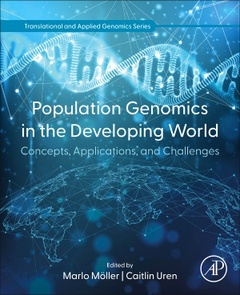Population Genomics in the Developing World Concepts, Applications, and Challenges Translational and Applied Genomics Series

Population Genomics in the Developing World: Concepts, Applications, and Challenges, a new volume in the Translational and Applied Genomics series, provides a comprehensive, up-to-date summary of the field of population genomics in developing countries. The book equips students, researchers, and clinicians with the practical skills and approaches necessary to face the unique challenges and opportunities of practicing population genomics in developing countries. Following a brief foundational overview, more than a dozen authors working in developing nations share applied case studies from the field, including rationale, methods, analysis, and outcomes to reinforce understanding. Key themes across the country specific chapters include efficient genetic data generation and effective computational and statistical tools to analyze population-level data. The book then discusses clinical interpretation of this data, from direct-to-consumer ancestry testing to translational and applied precision medicine. A final chapter considers ethical aspects of conducting genomic research in developing countries.
2. Why focus on population genomics in developing countries?
3. History of population genomics in developing countries
4. Latest developments and trends in the field of population genomics research
5. Field work in developing countries
6. Genotyping and sequencing technologies: access in developing countries
7. Computational tools and statistical approaches
8. Genotype versus phenotype versus environment
9. Direct-to-consumer genetic testing and the population genomics industry
10. Translating research to clinical utility – personalised medicine
11. Ethical issues in population genomics and impact on clinical implementation
12. Research uptake in developing countries and the role of various stakeholders
13. The future of population genomics in developing
Dr. Caitlin Uren currently works in the fields of human population genetics, bioinformatics and communicable and non-communicable diseases. Her initial research focused on identifying and characterizing genetic population structure in southern African human populations. This information was then used in the development of novel computational pipelines. In addition, she has been involved in the analysis of next generation sequencing data with the goal to provide a molecular diagnosis to patients with a suspected genetic disorders. She is currently involved in numerous projects that encompass data repositories, bioethics, bioinformatics, pharmacogenetics and population genetics. As an early-career researcher, it is her goal to further the human genetics field in Africa and to teach and guide the next generation of scientists.
Dr. Patrinos is internationally renowned for his involvement in the field of pharmacogenomics research. His research includes discovery work and addresses the issue of clinical implementation of pharmacogenomics in a holistic manner, including wet- and dry-lab, as well as public health genomics approache
- Addresses the unique opportunities to positively impact global health by practicing population genomics in developing countries
- Features applied case studies from genomic research in various developing nations, with clear instruction in research rationale, methods, tools, materials used, analysis, and outcomes
- Includes international chapter authors and population genomics experts practicing in South Africa, Gabon, India, South America, Central America, and Honduras, among other locations
Date de parution : 08-2024
Ouvrage de 472 p.
19x23.3 cm



